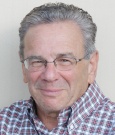The following essay by Kenneth R. Adler, MD, FACP, is adapted from The Big Casino: America’s Best Cancer Doctors Share Their Most Powerful Stories, which was coedited by Stan Winokur, MD, and Vincent Coppola and published in May 2014. The book is available on Amazon.com and
thebigcasino.org.
When I met Cecelia 18 months ago, she was a dynamic 82-year-old optimist with a gracious smile and a fierce devotion to her family. Cecelia had lost her husband to a sudden heart attack 10 years before, but with the support of her 8 children and 21 grandchildren, she still enjoyed a good degree of independence. Now here she was in my office, diagnosed with locally advanced rectal cancer.
Cecelia wanted to be very proactive about her condition, so she underwent chemotherapy and radiation therapy for 3 months before electing to have her cancer surgically removed. Unfortunately, soon after surgery she developed liver metastasis and embarked on another round of chemotherapy, which was followed by another related operation for small bowel obstruction.
That second operation was enough for Cecelia. “My cancer is uncooperative,” she told me. She expressed gratitude for what she described as a “blessed life.” She said that she’d always believed in God and that she was at peace with going home with hospice care.
Cecelia had shared many stories about her life during her time in the hospital. Before she was discharged, I thanked her for our relationship and said my goodbye. She died at home some 2 weeks later surrounded by her family. She was not in pain, and her family was at peace. I felt she’d had a good death.
During Cecelia’s illness I’d come to know many of her children, who’d taken turns at her bedside. When I feel a personal connection to a patient and his or her family, as I did with Cecelia, I find that attending the person’s funeral, wake, or shiva can help me to resolve my grief and cope with the sense of loss that always attends a patient’s death.
The hall where Cecelia’s family held her wake was full of family photographs and collages. Her children gladly pointed out the many highlights of her life. It’s often remarkable how much I learn about my patients at these events, even if I’ve known them for years. No matter how long I’ve served as someone’s physician, there is always more to know.
Grieving for Patients Who Die
We practitioners of hematology-oncology have the privilege of caring for people at what is often the most difficult time of their lives. “How do you do it?” is a constant query and a complicated one to answer. For me, the answer is bound up in my own practice of grieving for every one of my patients who dies—some of whom I may have known for 30 years—in a particular, personal way.
As physicians, we get to share wholeheartedly in our patients’ joys—birthdays, graduations, weddings, and the arrival of children and grandchildren. When a cancer recurs or becomes refractory to treatment, we also share in their sadness. When I attend a funeral or a wake, or visit a house of shiva, family members often raise unresolved medical questions. They may ask if we should have tried “one more drug to treat the cancer” or if we could have been “more aggressive” about a late-stage infection. These are often difficult questions, but taking the time to answer them and clarify “what happened” helps many family members achieve closure.
I sense genuine appreciation from my patients’ families when I’m present at their final event or otherwise when I pay my respects. This isn’t always possible. This past week alone, four of my patients died at home on hospice care. Closure becomes much more difficult when losses come in such proximity. As oncologists, we have to learn to grieve in our own private way. If time does not allow me to attend a wake or shiva, then I try to make a phone call or send a note to express my condolences.
Finding Comfort
Whether I have cared for someone for 3 months or 35 years, the final weeks always leave a lasting impression with a patient’s family. Staying in touch through that difficult time is critical in ending a good relationship. Saying goodbye to families I may have known for more than 30 years is never easy or simple.
As I made the rounds of the photo collages at Cecelia’s wake, I enjoyed hearing about family events and milestones. Talking about Cecelia brought her back to life for a moment. It was comforting to me and, I hope, to her family as well.
I do worry about the toll of suffering so much loss or of compassion fatigue. But by reflecting on my own process of grieving and doing what I can to find closure—with the support of my excellent colleagues and family—I manage to continue practicing hematology-oncology. The question becomes not “How do I do it?” but “How could I not?” ■
Dr. Adler is an attending hematologist-oncologist at Morristown Medical Center in New Jersey and a member of Regional Cancer Care Associates. He also is Chairman of the New Jersey Commission on Cancer Research and a member of the American Society of Hematology Committee on Practice.


